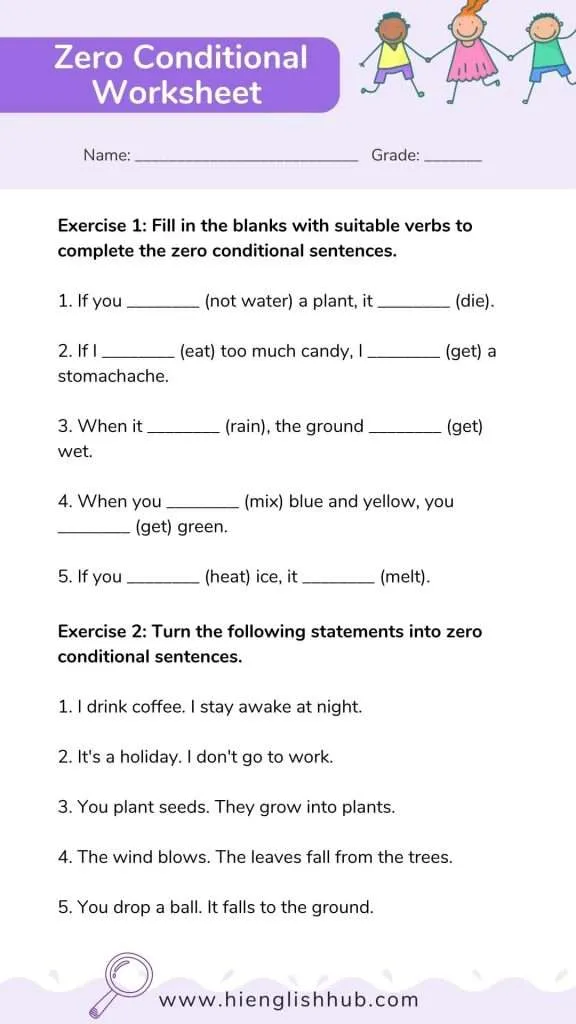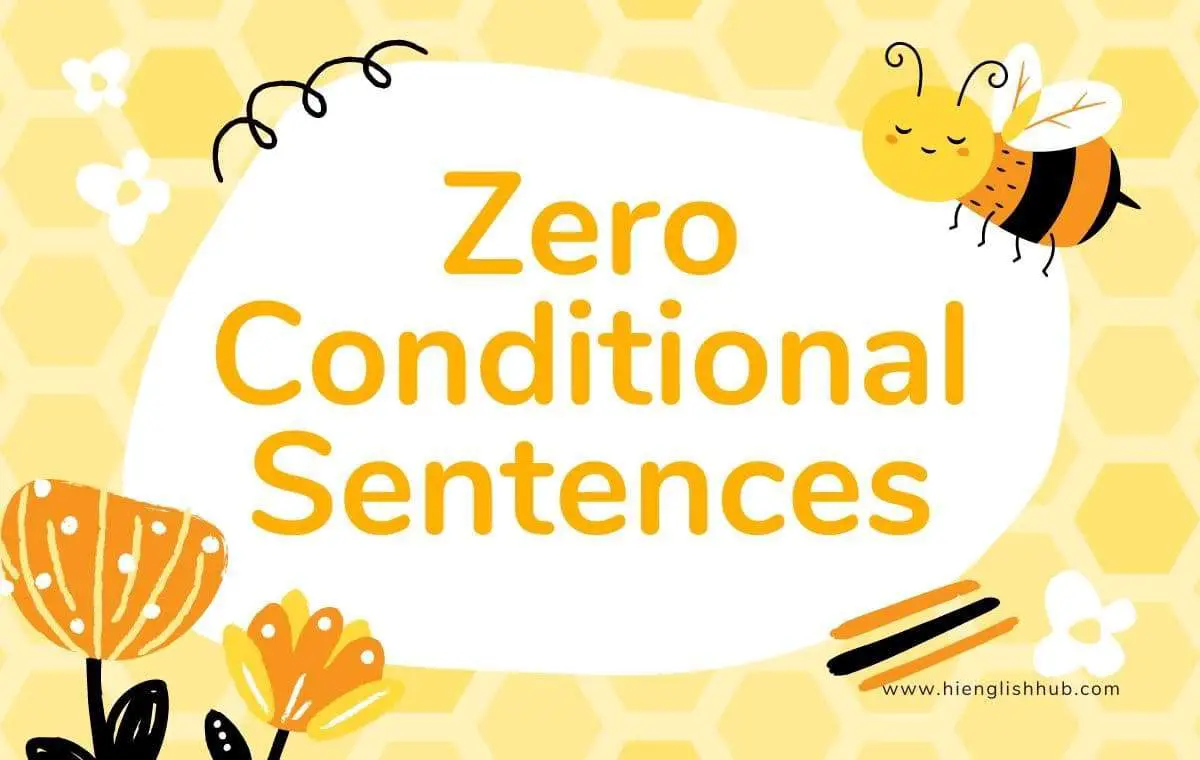Welcome to our beginner-friendly guide on zero conditional sentences!
If you’re on the journey of mastering the English language, you’ve likely encountered these unique sentence structures.
In this guide, we’ll delve into the nitty-gritty of zero conditional sentences, exploring their definition, structure, and uses. We’ll break down the concepts with easy-to-understand examples and even provide exercises to help you practice.
Whether you’re a beginner or an intermediate learner, this guide will offer a deeper understanding of this important grammatical structure.
Let’s dive in and demystify zero conditional sentences together!
Zero Conditional Sentences: Definition and Structure
You might be wondering, “What on earth is a zero conditional sentence?” Well, think of it as a fun way of expressing a universal truth or something that always happens under specific conditions.
It’s like a rule of life that’s pretty much set in stone.
You see, in English grammar, we have several types of conditional sentences, and zero conditional is the one we use for stating general facts or habits.
Okay, now that we’ve got the “what” part sorted, let’s move on to the “how.”
| Section of Sentence | Example | Explanation |
|---|---|---|
| If/When Clause | If you heat ice, | This is the condition (using “if” or “when” followed by a present simple verb). |
| Main Clause | it melts. | This is the result (using a present simple verb). |
So, the full structure of a zero conditional sentence, when put together, looks like this:
Full Sentence: If/When + subject + present simple verb, subject + present simple verb.
A few examples in table format would look like this:
| If/When Clause | Main Clause |
|---|---|
| If you heat ice, | it melts. |
| When the sun sets, | it gets darker. |
| If it rains, | the grass gets wet. |
| When you don’t eat, | you get hungry. |
| If you mix blue and yellow, | you get green. |
| When I don’t get enough sleep, | I feel tired. |
| If you don’t water flowers, | they die. |
| When it’s cloudy, | the temperature drops. |
| If you drink too much coffee, | you can’t sleep. |
| When you oversleep, | you miss the bus. |
Note: In English, “when” and “if” can both be used in zero conditional sentences to introduce the condition or situation.
10 Zero Conditional Sentences
- If you don’t brush your teeth, you get cavities.
- When you press that button, the computer turns on.
- If I don’t charge my phone, it dies.
- When it snows, the roads become slippery.
- If you leave milk out of the fridge, it spoils.
- When you exercise, your heart rate increases.
- When you spend too much time in the sun, you get sunburn.
- If you drop an apple, it falls to the ground.
- Dogs bark when they see a stranger.
- When you add salt to the water, it boils at a higher temperature.
Zero Conditional Sentences Exercises With Answers

Exercise 1: Fill in the blanks with suitable verbs to complete the zero conditional sentences.
- If you ________ (not water) a plant, it ________ (die).
- If I ________ (eat) too much candy, I ________ (get) a stomachache.
- When it ________ (rain), the ground ________ (get) wet.
- When you ________ (mix) blue and yellow, you ________ (get) green.
- If you ________ (heat) ice, it ________ (melt).
Answers:
- If you don’t water a plant, it dies.
- If I eat too much candy, I get a stomachache.
- When it rains, the ground gets wet.
- When you mix blue and yellow, you get green.
- If you heat ice, it melts.
Exercise 2: Turn the following statements into zero conditional sentences.
- I drink coffee. I stay awake at night.
- It’s a holiday. I don’t go to work.
- You plant seeds. They grow into plants.
- The wind blows. The leaves fall from the trees.
- You drop a ball. It falls to the ground.
Answers:
- If I drink coffee, I stay awake at night.
- When it’s a holiday, I don’t go to work.
- If you plant seeds, they grow into plants.
- When the wind blows, the leaves fall from the trees.
- If you drop a ball, it falls to the ground.
FAQs On Zero Conditional Sentences
What Is An Example Of A Zero Sentence?
Here’s an example of a zero conditional sentence: “When you don’t wear a seatbelt, you risk injury in a car accident.”
What Are The 4 Types Of Conditionals?
The four types of conditionals in English are:
- Zero Conditional: Used for expressing universal truths or facts that always happen (e.g., “If you heat ice, it melts.”)
- First Conditional: Used for real and possible situations in the future (e.g., “If it rains, I will stay at home.”)
- Second Conditional: Used for unreal or hypothetical situations in the present or future (e.g., “If I won the lottery, I would travel the world.”)
- Third Conditional: Used for unreal situations in the past (e.g., “If I had studied harder, I would have passed the IELTS exam.”)
What Is The Difference Between Zero Conditional And First Conditional?
Zero Conditional: The zero conditional is used for situations that are always true if the condition is met. It’s a factual conditional—used for scientific facts, general truths, or habits.
The structure of a zero conditional sentence generally is: “If/When + present simple tense, present simple tense.”
For example, “If you heat water to 100 degrees Celsius, it boils.” Here, it’s a universal fact that water boils at 100 degrees Celsius.
First Conditional: The first conditional, on the other hand, is used for real and possible situations in the future.
It expresses a condition that is likely to happen and the probable result of this condition.
Its structure is: “If + present simple tense, will + base form of the verb.”
For example, “If it rains tomorrow, I will stay at home.” This sentence is based on a future possibility (it might rain tomorrow) and the result (I will stay at home) if that condition is met.
So, in essence, the zero conditional is about what is always true, while the first conditional is about what might happen in the future.
How Do You Know Which Conditional To Use?
The conditional you use depends on the situation you’re describing:
- Use the zero conditional when you want to express a universal truth or a fact that always happens under specific conditions.
- Use the first conditional when you want to talk about real and possible situations in the future.
- Use the second conditional for unreal or hypothetical situations in the present or future.
- Use the third conditional for unreal situations in the past.
Remember, it’s all about what you’re trying to express!
Final Thoughts
Zero conditional sentences are a crucial part of English. They help us express always-true facts or habits under specific conditions.
From daily conversations to scientific explanations, they’re all around us.
While it may take some practice to master them, it’s a rewarding journey.
If you found this blog post helpful and insightful, why not share it with others? Whether you have friends, family, or colleagues who are learning English, they may find this guide to zero conditional sentences valuable. Click on the share button below, or simply copy the link to this page to share. Let’s spread the knowledge and help others improve their English skills too!


